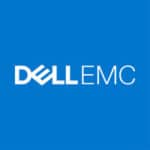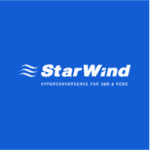Data storage solutions comprise a range of business-grade products for safely holding large volumes of data for archiving or to support critical applications and analytics. While the data storage landscape used to be relatively simple, the current market is full of myriad options from a diversity of storage types, including network attached storage (NAS) and storage area network (SAN) devices, flash arrays, and cloud products.
To help businesses choose, we compared different solutions on how well they met enterprise needs for pricing and features. Here are our top picks:
- Dell EMC PowerMax: Best SAN
- StarWind Virtual SAN: Best small business SAN and HCI
- Asustor Lockerstor 10 AS6510T: Best NAS
- Amazon Web Service: Best public cloud storage
- Pure Storage FlashArray//C: Best flash array
- Acronis Cyber Protect: Best backup software
We also provide a buyer’s guide to help you make sense of the market and better choose the right type of storage solution to meet your needs.
Jump to:
- Top Data Storage Solutions
- How to Choose the Best Data Storage Solution for Your Business
- How We Evaluated Data Storage Solutions
- Frequently Asked Questions (FAQs)
- Bottom Line: Data Storage is a Critical Focal Point for Your Business
Dell EMC PowerMax
Best SAN for enterprises

PowerMax is often used for mission-critical traditional, container, and mainframe-based consolidated IT workloads. If you’re looking for a long-term investment for your business’s top databases and ecommerce sites, PowerMax is a strong option for businesses willing to foot the bill.
Pricing
Dell offers multiple payment options for its storage products. Explore Dell’s options to find one that’ll best fit your budget and needs. Contact Dell or one of its technology partners for a detailed quote.
Features
- Snapshots
- Encryption
- Thin provisioning
- Compression
| Pros | Cons |
| NVMe-based storage to support high-speed applications | Raw capacity of the array is unclear |
| Good for data centers |
StarWind Virtual SAN
Best SAN for SMBs

Pricing
For the paid version of VSAN, you’ll need to request pricing from StarWind. You can also request a demo.
Features
- Command Center user interface (UI) for managing hardware and software resources
- Migration assistance for moving virtual machines to StarWind
- Support for NVMe over Fabrics
- Plugin for integration with VMware vSphere
| Pros | Cons |
| Free option available | May not satisfy all large enterprise needs |
| Highly reviewed customer support | Some users found setup and management difficult, requiring significant technical expertise |
Asustor Lockerstor 10 AS6510T
Best network-attached storage solution

Pricing
- $1,219 (Amazon)
Features
- Expansion bays available for more storage space
- Adobe Creative Cloud integration available
- Snapshots
- Encryption
| Pros | Cons |
| Integrates with backup software | Asustor doesn’t offer much information about support |
| Offers four free camera channel licenses for teams that need a surveillance system |
Amazon Web Services
Best public cloud storage

If you’re interested in AWS’s database product, Relational Database Service (RDS) helps storage teams set up their databases with less manual work. Smaller storage teams will particularly benefit from a managed database service, particularly if they don’t have many developers or an extensive storage infrastructure.
Pricing
AWS pricing covers a range of free and paid options.
- S3 free tier: 5 GB for 12 months
- S3 Standard tiering: $0.023/GB for the first 50 TB/month; $0.022/GB for the next 450 TB/month; $0.021 for over 500 TB/month
- Amazon RDS free tier: Limit of 20 GB storage and 750 hours per month
- Amazon RDS: Pricing dependent on database
Features
- Multiple storage classes priced accordingly (S3)
- Data replication to other Amazon regions (S3)
- AWS and third-party analytics platforms available for object-stored data (S3)
- Choice of six relational databases to deploy in the cloud or on-premises (RDS)
| Pros | Cons |
| Web-based object storage allows users to manage their storage anywhere they have access to the internet | Public cloud storage offers less control over security, so determine whether AWS has the security measures your team needs for sensitive company data |
| Managed database service is helpful for smaller storage and dev teams |
Pure Storage FlashArray//C
Best flash array

Pricing
Contact Pure Storage for pricing information—the vendor requires potential customers to submit a quote request for any details.
Features
- Encryption
- Thin provisioning
- Deduplication
- Ransomware remediation through Purity, FlashArray’s management software
| Pros | Cons |
| Supports NVMe drives | Not the best choice on the market for the most mission-critical enterprise applications |
| Technical account manager available for businesses that want one |
Acronis Cyber Protect
Best backup software

Pricing
The following prices are for one workstation; Acronis also provides pricing for servers, virtual hosts, Windows server essentials, and business office suites:
- Acronis Cyber Protect Standard (with security features), $85
- Acronis Cyber Protect Backup Advanced, $109
- Acronis Cyber Protect Advanced (with security features), $129
Features
- Single management console
- Support for virtual server backup, including Citrix XenServer and VMware vSphere
- Option to run in the cloud, with cloud disaster recovery capabilities
| Pros | Cons |
| Doubles as stand-in endpoint protection platform if your business doesn’t have one yet | Could be pricey for some SMBs, depending on the number of servers and workstations to protect |
| Managed service option for MSPs |
Key Features of Data Storage Software and Solutions
While storage solutions and software encompass a very broad range of data management products, there are a few common functions that most storage systems should have:
- Appropriate speed. While not all storage systems are as fast as NVMe-based flash arrays, they should be capable of retrieving data at the speed your applications require.
- Reliability. Storage solutions should be trustworthy locations to store data. Data is one of the most important commodities your business uses, and storage products should have infrequent downtime and mitigation if an outage or disaster does occur.
- Capacity. As organizations store larger volumes of data every year, storage products have to rise to the occasion. They should be capable of scaling, too, so you don’t have to trade out storage systems every few years your business grows.
- Appropriate pricing. While you’ll pay accordingly for a high-quality storage system, the vendor should be clear about their benefits and fulfill those promises rather than overshooting the price tag.
How to Choose the Best Data Storage Solution for Your Business
While purchasing a storage solution takes time and communication among your organization’s teams, it doesn’t have to be needlessly complicated.
Consider multiple solutions
Rarely does one type of data storage software or hardware fit all business use cases. The likelihood that you’ll need both a NAS and a SAN for different storage situations is high, for example. Some storage products support critical applications, while others store archive data that only needs to be accessed once a year. It’s cheaper in the long run to select the best-fitting solution for a particular use case.
Take your time
Don’t rush to buy a product—you want to find something long-lasting and don’t want to hurry into a purchase you’ll regret. Also, spending some time reflecting on a vendor’s offerings and their marketing pitch is never a bad idea.
Communicate with vendors
Don’t just assume that a vendor has everything you need—or offers quality customer support. Ask to speak with representatives from the company you’re considering purchasing from, and note their transparency. Ask questions about technical support availability.
Don’t skimp on quality
Finding a product that fits your budget and your feature list can be difficult, but while it’s good to stay within budget, don’t pick a lackluster product that will only last your business a few years. High-quality storage products are a long-term investment.
Consider your storage teams
Storage teams are not all equal in experience and skills. You want a product that can grow with your business and be customized, but you also want your team to be able to use it immediately. Look for products that balance ease of use with the level of customizability your storage personnel need based on their experience. This goes for storage products’ technical support as well: a highly experienced storage team probably won’t need to rely on a vendor’s support as much, but a junior team might.
How We Evaluated the Best Data Storage Solutions
To select the top storage solutions in the categories above, we used product analysis rubrics, user review data, and overall insights on the enterprise storage market. We selected the product that scored highest on our rubric from the following buyers’ guides:
We also selected some of the best-known, most popular, and highest-rated products in the following buyers’ guides:
We also selected StarWind for the best SMB SAN—it doubles as SAN and HCI solution. StarWind’s hyperconverged appliance appears on our list of best hyperconverged infrastructure vendors, and StarWind has high user reviews overall.
Enterprise Storage Forum uses a combination of feature and product analysis and market and user experience to select and review storage solutions. In our rubric-informed buyers guides, we grade products by the number of criteria they meet and features they offer.
Frequently Asked Questions (FAQs)
If you still have questions about storage products, we cover some points that may come to mind when researching solutions for your business.
What are the key considerations when evaluating the best data storage software?
Top enterprise needs, vendor compatibility, and price are three of the top points to consider when looking for a storage product. It’s never a bad idea to find a whiteboard and shortlist your business’s three to five ideal features before you try to find the product that offers them. And while price isn’t the most important consideration, work to stay in budget. Often, enterprise-class solutions take plenty of time and effort to deploy, so ensure you’re prepared for such a product.
How do data storage solutions support data backup and disaster recovery efforts?
Being able to store copies of data in multiple locations helps businesses protect their data from loss. The cloud plays a key role in this—if your data is stored in multiple AWS regions, you won’t lose it all if one region has a major outage. Many storage solutions also integrate with popular backup providers. We recommend choosing storage products that offer either backup integrations or features that are already built into the storage hardware or software.
Are there specific data storage solutions that are tailored for particular industries?
The short answer: not really. The longer answer is that certain products are better suited to certain use cases within certain industries. For example, archival solutions (like cold storage tiers in AWS or Microsoft Azure) store data that isn’t accessed frequently. Businesses in the financial and healthcare industries are often required to store data for years, so archive storage is one of the cheapest ways to do that. On the other hand, businesses in those same industries also need to process data rapidly, so they’ll need flash arrays, too.
There will always be a few products best for a certain industry, like a NAS unit ideal for multimedia teams because of its specific features. But generally speaking, organizations in most industries need multiple storage products for different data use cases.
Bottom Line: Data Storage is a Critical Focal Point for Your Business
Data storage software and solutions help storage teams manage large volumes of data and protect it. It’s no longer an option for businesses to just throw their money at the nearest cloud storage provider and hope it sticks—most organizations have very specific needs. The key is getting to know your own business’s needs and how specific vendors could meet them. If you want a storage vendor to be a true partner, you’ll need to do research.
Lastly, don’t get discouraged—finding a good storage solution takes time and research, but the result will serve your organization and its data for years to come.
Read our recommendations for choosing storage management software next.


